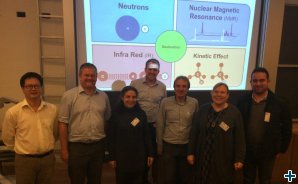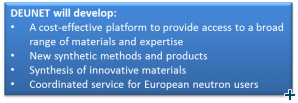The SINE2020 Chemical Deuteration WP:
Interview with the coordinator Hanna Wacklin

Hanna Wacklin
In an interview Hanna Wacklin tells about the SINE2020 collaboration activity on Chemical Deuteration, which she coordinates.
Inês Crespo, 29/06/2016
Contact: Hanna Wacklin
Hanna Wacklin is Instrument Scientist for Neutron Reflectometry at the European Spallation Source in Sweden. She is the coordinator of the SINE2020 collaboration activity on Chemical Deuteration . In the following interview she tells us about the story of the activity, its aims, and how the group is planning to accomplish results.
Inês Crespo: Before we start, what is deuteration?
Hanna Wacklin: Neutrons have a special property as they can see hydrogen and the heavy isotope deuterium completely differently. Hydrogen atoms can thus be replaced with deuterium which will be more visible. In principle all neutron scattering methods can employ this to highlight a structure or components in a structure, and only see certain parts at a time, and therefore solve very complex structures. A large part of materials analysed by neutron scattering are organic, and that is what we are aiming at, i.e. organic molecules that you can use e.g. in liquid crystals or other everyday-materials. By replacing the hydrogen in them with deuterium we can either obtain a better signal when analysing them with neutrons, or better contrast, or highlight specific parts of a structure to understand the relation between components.
A lot of the things that we use in our everyday life, such as personal-care products like cosmetics, cleaning products, as well as a number of advanced materials as e.g. solar cells have these types of components, so this technique can be widely applied.
How did the idea for the SINE2020 collaboration activity on Chemical Deuteration come up?
We have been talking with Giovanna Fragneto from the Institut Laue-Langevin (ILL) on how we could collaborate more in some aspects of deuteration, as we are both interested in lipids, and we had been working together on a PhD project in deuteration of lipids in cell cultures. But when we saw the SINE2020 consortium forming, we thought that it would be nice to involve other facilities, and other types of deuteration expertise. We’ve contacted the facilities and got ISIS and FZ Jülich involved, as well as ANSTO in Australia as an observer.
What are the aims of the activity and how will you achieve them?
Our goal is to develop both methods and a platform for users. The idea is that by forming a network of deuteration labs which have different kinds of expertise, and can deuterate and synthesise different kinds of molecules, we can more likely produce different types of compounds for the user community, and broaden the types of synthesis that we can make. Our goal is thus to set-up a new platform that, after SINE2020 is concluded, can offer access to the facilities to the European user community.
We will also prepare a survey for the users so that we can learn what the needs are, how the user community would like such a platform to function (how it is managed, how people get access to it, who funds it). These are very important questions as we have never tried to do this together. Currently one applies for beamtime at one specific facility. But what if the molecule you need has to be deuterated at some other facility? Or maybe even at two different facilities. How will it work if we have a joint access system? Those are the questions we want to address.
What are the advantages of taking part in this collaboration activity?
For us the biggest advantage is to have this network. We will collaborate on joint projects where part of a material is made in a lab, the rest is made in another lab, and the third lab makes the final purification and characterisation, so we can combine our expertise. This will allow us to produce new materials that are not available to the user community yet, as for instance bio-plastics.
What about the challenges?
It is a challenging task as the team will do more complicated chemistry than what we are used to do in our deuteration labs. Our capabilities are still quite basic as compared to what university researchers can do in chemical synthesis. But in ANSTO in Australia they have set-up a new deuteration lab a few years ago and they have made great progress, so we hope we can learn from their experience.
What are the benefits of taking part in a project supported by SINE2020?
Other than the importance of collaboration, I think we will benefit from the fact that there is a dissemination WP. This means that there is a website in which we can have a presence and be visible to the user community as well as to other facilities.
Furthermore we will benefit from the outreach activities that SINE2020 will do as a consortium. Typically the materials used in industrial components are very complex materials, so the benefits of using deuterium are obvious. However industry is often not familiar with the benefits of using neutron scattering or deuteration so we’ve decided to advertise also this aspect. Together with the Industry activity we will not only advertise the techniques themselves but provide consultation on how one can select the materials to be analysed.
Latest news
New MicroStrip Gas Chamber to be produced within the SINE2020 Detectors collaboration
Bruno Guerard from ILL told us the plan to develop a Helium-3 based MicroStrip Gas Chamber (MSGC) neutron detector with a novel 2D readout. Read more.
Workshop I of the SINE2020 WP on Data Treatment
Fruitful discussions were held by 26 WP members who met at PSI in April to present the software programs the WP will focus on. Read more.
Don't forget to register to the SINE2020 General Assembly
The SINE2020 GA will be held at the University of Coimbra in Portugal. Please don’t forget to register. Read more.









